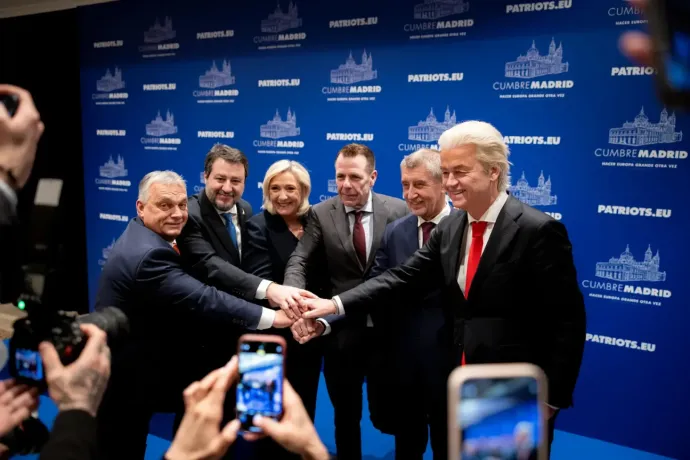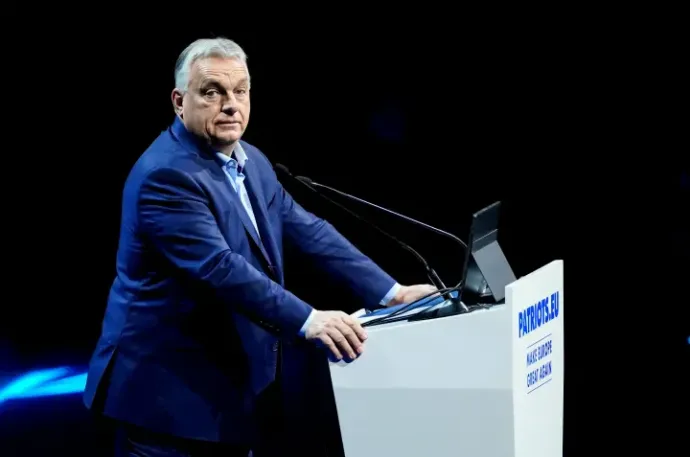
"Within just a few weeks, the Trump-tornado has transformed the world. An era has ended. We were heretics yesterday, but today we are the mainstream", Hungarian Prime Minister Viktor Orbán announced on Saturday at the Patriots for Europe rally in Madrid. According to the Prime Minister, Hungarians have now managed to accomplish what fifteen years ago many saw as madness and political suicide: they turned against the global progressive elite. By now, many other countries have followed suit, and there are now "many of us heretics, we are big and we are strong".
The Hungarian Prime Minister's words seem to suggest that, with the creation of a new family of political parties in Europe and the election of Donald Trump, he too has arrived at a new era. After 36 years of rebellion and 19 years of governance (15 of them with a two-thirds majority), he now claims to belong to the majority. The reason why the rhetorical shift might be somewhat surprising and noteworthy is that Orbán's entire political career so far has been built on the narrative of rebelling against the global elite and being "a street fighter", practically like David against Goliath.
"We are the sand in the machinery, the stick in their wheel, the thorn under the fingernail, we are the ones who will break their ax and their knives", the Prime Minister, who spent the last three and a half decades rebelling against the communists, the left, Gyurcsány, the IMF, Soros and Brussels, said on 15 March last year. Over the past few years, the government's communications machine has been running at full speed to manufacture various enemies who are all threatening the security, sovereignty and future of Hungarians, and from whom Viktor Orbán alone can protect the country.
Rebellion is a key element of Orbán's politics, the origins of which he himself traced back to 2002 in a speech at the 2023 Tranzit Festival. After they lost the parliamentary elections, Fidesz started to build the narrative that, although they were in government between 1998 and 2002, they were not the ones in power.
"And, that's the thing. That's why we are the rebels, because power is in the hands of the left. And one is to rebel against those in power when they want to do things to us that we don't want."
– Orbán said two years ago, after winning four elections in a row with a two-thirds majority. Even after the utter annihilation of the left-wing parties and 13 years of unlimited power, the prime minister tried to prove that he was in fact in minority because the leftist powers want to impose migration and "gender" on Hungarians and are seeking to plunder the country. "If we don't want to be exploited, we have to resist and we have to fight, that is, to rebel," said the prime minister, whose circles have amassed staggering fortunes over the past decade and a half.
The Prime Minister felt so oppressed even after 2018 that for a while he took to publishing his writings on his website as in samizdat-form, making it seem like he had no channel for sharing his thoughts with the Hungarian public at large. The role of the repressed politician has proven ideal on any issues in recent years: he could tell his voters that he is the common man fighting for normalcy. It is easier to identify with this character than with the distant, invisible forces in the background and the Brussels bureaucrats whom the government propaganda has depicted as the devil himself.
There has hardly been a speech by Orbán in recent years in which he has not made a reference to the fight against Brussels. As recently as November, when speaking on Kossuth Rádió, he said that he was fighting against the Brussels elite like a rebel, because they were trying to oppress Hungarians and want to settle migrants in Hungary against our will.
“Naturally, the globalist elite hates us. The Brussels bureaucrats, the US Democrats and the Soros network have launched a manhunt against us. They are hunting us because we defended our country.”
– he said at the Madrid event last weekend.
He has also inserted his support of Donald Trump into his narrative against the globalist elite. According to him, the Republican candidate is also rebelling against the global elite, which is why they have tried to obstruct him by all means possible. Orbán, who is so concerned about Hungary's sovereignty, campaigned for Trump by throwing the entirety of Hungarian diplomacy behind him. For months, Hungarian government officials have been saying that Trump's election would change everything, that he would bring peace to Ukraine in 24 hours, and that the Hungarian people would be much better off.
"A different sun will rise over the Western world starting Tuesday morning", Viktor Orbán promised on Kossuth Rádió a few days before Trump's inauguration. A week later, he said that the Western part of the world had indeed changed, and that “Hungary (...), which they had tried to isolate, is no longer isolated, no longer sidelined, no longer marginalized, but we are the mainstream. We are back on the main street of history, as they like to say in Brussels: we are the mainstream.”
From rebel to the mainstream, from minority to majority, this is what Orbán is trying to build right now.
It almost became a cliché to say that the Hungarian Prime Minister was left on his own and isolated in the European Union, especially after Fidesz was essentially driven out of the European People's Party. The differences became even greater after the outbreak of the Russian-Ukrainian war, since Orbán has repeatedly tried to derail joint European action against the Russians.

However, in recent years, in several countries, elections have produced results favourable for Fidesz. Orbán's allies have won elections in Italy, Slovakia, the Netherlands and Austria as well, but he can also consider the founding of the Patriots for Europe party family a major political success. With all this in mind, the Hungarian Prime Minister is keen to show that
he is no longer an isolated pariah in international politics, but is now the one who sets the mainstream.
Meanwhile, Orbán has also sent a message to his camp at home. Since the outbreak of the clemency scandal and the emergence of Péter Magyar, Fidesz has lost a lot of voters, and last June achieved its worst ever result in the EP elections. Opinion polls suggest that Orbán will be facing a real challenger in 2026 and that Fidesz's victory is very much in danger.
Fidesz's most important goal in such a situation is to stop the exodus of their constituents and retain their voter base. One way of doing this is for Orbán to reassure his voters that they are still the majority, regardless of what people are experiencing around them. People like being part of the mainstream, part of the force, and the Prime Minister now wants to reaffirm Fidesz's voter base that this is still the case.
However, Orbán is not about to bring an end to the 36 years of rebellion, and in no way does this mean that from now on, the years of peace will come. In January he announced the second phase of the operation to take Brussels. "The strange thing right now is that although we are in the majority, we still have to rebel, because while the change happened in Washington, it did not happen in Brussels," he said on the public station Kossuth Rádió after Trump's inauguration. – So while we are the new majority, we are the new main street of history, we still have to do the work in Brussels, we still have to rebel there, because otherwise those in Brussels will impose on us the things that the US president is in the process of doing away with in America, and that we have successfully fought against over the past few years."
We sent questions about the rebellion to Bertalan Havasi, the Prime Minister's press chief, and to Fidesz's press office. Among other things, we wanted to know
- whether the Prime Minister's former rebellion had come to an end,
- and if so, what prompted it,
- and if it has not ended, in what areas is the rebellion continuing?
As of the publication of this article, we have not received a reply.
For more quick, accurate and impartial news from and about Hungary, subscribe to the Telex English newsletter!